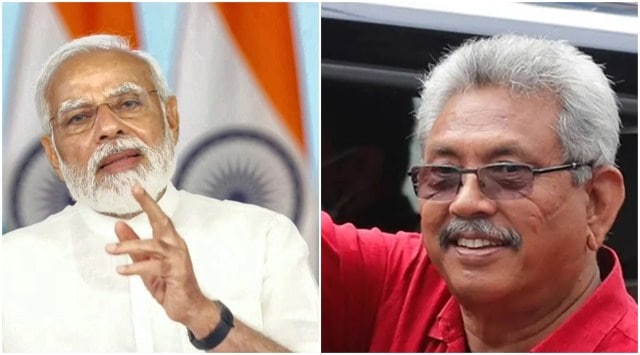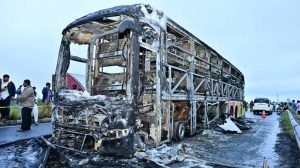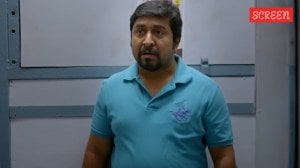Stay updated with the latest - Click here to follow us on Instagram
Lanka official says PM wanted Adani to get project; retracts, Gotabaya denies
Ferdinando withdrew his statements soon after, saying he was 'emotional'. Gotabaya’s office also 'vehemently' denied the allegations.
 Indian Prime Minister Narendra Modi and Sri Lankan President Gotabaya Rajapaksa (PTI, AP)
Indian Prime Minister Narendra Modi and Sri Lankan President Gotabaya Rajapaksa (PTI, AP)A senior Sri Lanka official claimed before a Lankan parliamentary panel that Prime Minister Narendra Modi allegedly pressured President Gotabaya Rajapaksa to award a power project to the Adani Group, but retracted the statement a day later as the controversy spiralled. Sri Lanka President Rajapaksa “vehemently” denied the allegation.
The retracted claim is related to a 500-megawatt renewable energy project in the island nation’s northern Mannar district. The Chairman of Sri Lanka’s Ceylon Electricity Board (CEB), MMC Ferdinando, appearing before a parliamentary panel in Colombo Friday, claimed that during his conversation with Rajapaksa, the President had told him that Modi had put pressure on him to award the project to the Adani Group.
Ferdinando, who was addressing the Committee on Public Enterprises (COPE), can be heard saying that Rajapaksa “told me that he was under pressure from Modi”. The senior official told the committee that the President had asked him to give the project to the Indian company.
He also told the committee that CEB has never given unsolicited proposals in the past, even on a government-to-government basis. The discussion between Rajapaksa and Ferdinando had allegedly taken place when he was summoned by the President following a meeting chaired by him.
But the day after his appearance before the panel, Ferdinando withdrew his statement, claiming he had become “emotional” due to some of the questions he was asked that appeared to insinuate wrongdoing by him.
Rajapaksa, meanwhile, issued a swift denial, first on Twitter, where he said: “Regarding the award of a Wind Power Project in Mannar, I categorically deny authorisation to award this project to any specific person or entity. I trust responsible communication in this regard will follow.”
Later, his office issued a longer statement, “vehemently denying” influencing anybody in awarding the project. The statement said Rajapakse “categorically stated that he had not at any time given authorisation to award a wind power project in Mannar to any person or any institution.”
“The President vehemently denied the statement made by the Chairman of the Ceylon Electricity Board at the Parliamentary Committee on Public Enterprises in this regard.”
The statement also said: “Sri Lanka is currently in an acute shortage of power and President desires to expedite implementation of mega power projects as early as possible. However, no undue influence will be used in awarding such projects. Project proposals for large-scale renewable energy projects is limited, but special attention will be paid to the selection of institutions for the projects, which will be carried out strictly in accordance with the transparent and accountable system by the government of Sri Lanka.”
🚨 Limited Time Offer | Express Premium with ad-lite for just Rs 2/ day 👉🏽 Click here to subscribe 🚨
The controversy comes just days after Sri Lanka had changed its laws to do away with competitive bidding for energy projects. The opposition Samagi Jana Balwegaya party alleged in Parliament during the passage of the amendment that the change was made with the intention of regularising the award of the Mannar contract to the Adani Group.
SJB parliamentarian Nalin Bandara pointed to concerns that competitive bidding was being done away with “to make way” for projects like the Adani Group’s. Another party member, Harsha de Silva, proposed an amendment to ensure that projects beyond 10MW go through a competitive bidding process, and said eliminating competitive bidding would open the door to corruption.
CEB unions are also angry and had threatened a country-wide strike. But they called it off after a presidential order declaring electricity an essential service.
“Arrangements are being made at a rapid pace to gift the most prolific wind energy belt in the country” to the Adani Group, the CEB Engineers’ Union said in a statement.
It demanded that the government “stop the handover of the country’s wind and solar resources to the Adani Group… without following the competitive bidding process”.
There was no immediate response from India or the Adani Group regarding the controversy.
The Adani Group has been increasing its presence in Sri Lanka over the past few years.
Last year, it bagged a contract to develop and run the strategically significant Western Container Terminal of Colombo Port, with a 51 per cent stake.
Last October, Adani Group chairman Gautam Adani visited Sri Lanka and held talks with President Rajapaksa about investment opportunities. He visited the Northern Province, which includes the coastal Mannar, Jaffna and Killinochi districts. There are already some wind farms in the region.
Six month after the visit, the Adani Group signed a Memorandum of Understanding to set up two renewable energy projects in Mannar district and at Pooneryn, in Killinochi district.
The terms of the agreement, signed between the Lanka government and the Adani group on March 12, are not public. It had come at a time the Indian government had begun extending aid to its crisis-hit southern neighbour.
The signing was reported by a Sri Lankan newspaper. The lack of transparency had raised concerns even at the time.
In the Sri Lankan Parliament last week, Power and Energy Minister Kanchana Wijesekara said the amendment bill was an excellent opportunity to remove a legal obstacle that had been in place since 2013, according to the Sunday Times newspaper.
The country could no longer rely on coal and diesel plants. Many Acts currently in operation actually hamper renewable energy projects and a section of officials regularly try to use existing laws to block such projects from being implemented, Minister Wijesekara claimed.
Sri Lanka also sees this as an opportunity to trade electricity with India. In an interview with The Indian Express earlier this year, Sri Lankan High Commissioner to India Milinda Moragoda said Mannar was ideally located for this. “Potential for wind energy is 5,000 MW in Mannar. If that can be exploited… that is something that both sides are looking at. Then we can look at exporting electricity to India. And we can import electricity from India, because the [undersea] cables are not a big deal to lay. Right now, we are one of the few countries with whom you do not have energy relations — in the north you have with Bangladesh, Bhutan, Nepal,” Moragoda said.
With inputs from Nirupama Subramanian







